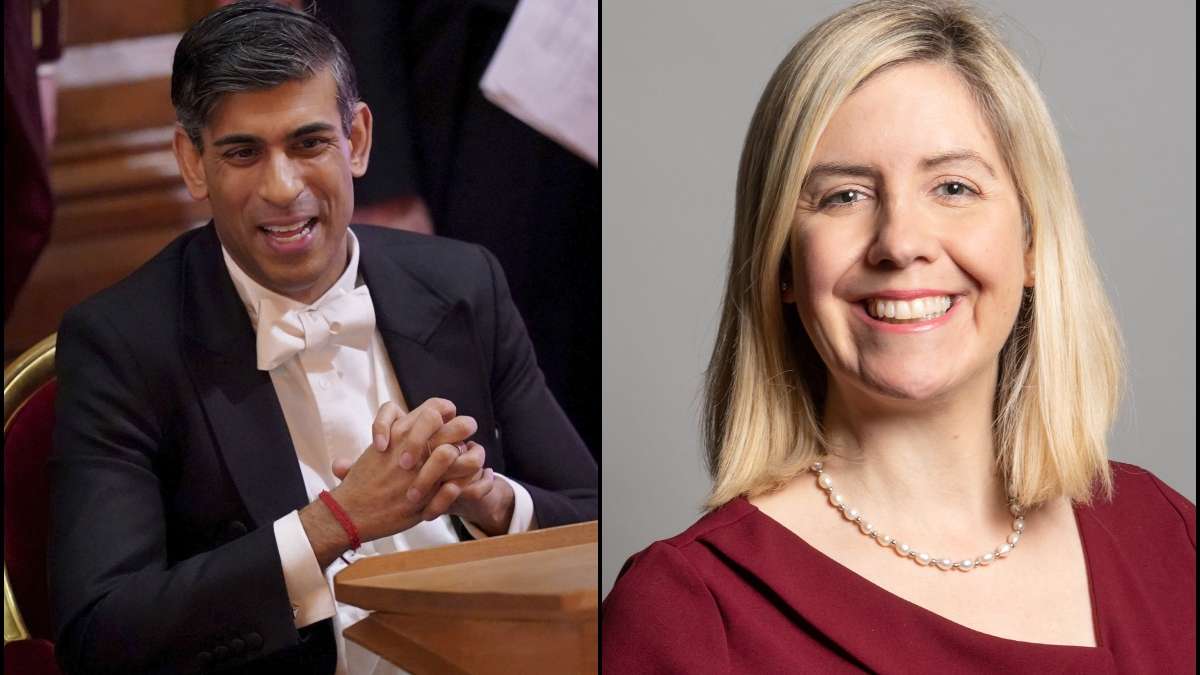
[ad_1]

In a dramatic change of events, British Prime Minister Rishi Sunak is facing his first no-confidence letter from an MP of his own party after a high-stakes cabinet reshuffle the previous day, highlighting deep divisions within the Conservative Party, also referred to as Tories.
Conservative MP Andrea Jenkyns posted a copy of her letter to Graham Brady, the chair of the 1922 Committee, saying ‘enough is enough’ hours after Sunak’s dramatic reshuffle on Monday. “It is time for Rishi Sunak to go and replace him with a ‘real’ Conservative party leader,” she said on platform X.
In her letter, Jenkyns wrote, “If it wasn’t bad enough that we have a party leader that the party members rejected, the polls demonstrate that the public reject him, and I am in full agreement. It is time for Rishi Sunak to go.”
According to the Daily Mail, the Conservative Party allows MPs to force a vote of no confidence in their leader. Such a motion would be triggered if 15% of the 350-member party submitted a letter to the chair of the 1922 Committee, which means that 53 more MPs need to submit letters for a full no-confidence vote to be held against the British PM and Tory leader.
As per law, Sunak was immune from a no-confidence vote in the first year of his Tory leadership. However, he passed 12 months in the role on October 24, which means that he is now at risk of a no-confidence motion against him.
Sunak’s dramatic Cabinet reshuffle
In a major Cabinet reshuffle, Sunak appointed former Prime Minister David Cameron as the new foreign secretary. This came after Suella Braverman was fired as home secretary and James Cleverly was appointed to replace her, leaving the top job open at the Foreign Office.
Notably, Cameron is not an elected member of the UK Parliament and his appointment is endorsed by the Sunak government in a major cabinet reshuffle following a controversy that broke out after the Indian-Origin foreign secretary wrote a “controversial” piece. She is considered a divisive figure who drew anger for accusing police of being too lenient with pro-Palestinian protesters.
“The Prime Minister has asked me to serve as his Foreign Secretary and I have gladly accepted. Though I may have disagreed with some individual decisions, it is clear to me that Rishi Sunak is a strong and capable Prime Minister, who is showing exemplary leadership at a difficult time,” wrote Cameron on social media platform, X.
Cameron’s appointment, who served as UK Prime Minister from 2010-2016, came as a surprise to seasoned politics watchers. It’s rare for a non-lawmaker to take a senior government post, and it has been decades since a former prime minister held a Cabinet job.
The government said Cameron will be appointed to Parliament’s unelected upper chamber, the House of Lords. The last foreign secretary to serve in the Lords, rather than the elected House of Commons, was Peter Carrington, who was part of Prime Minister Margaret Thatcher’s government in the 1980s.
It marks the return to government of a leader brought down by Britain’s decision to leave the European Union. Cameron called the 2016 EU membership referendum, confident the country would vote to stay in the bloc. He resigned the day after voters opted to leave. Sunak was a strong backer of the winning “leave” side in the referendum.
Why was Braverman sacked?
Braverman’s exit was less surprising. Sunak had been under growing pressure to fire Braverman — a hard-liner popular with the authoritarian wing of the governing Conservative Party — from one of the most senior jobs in government, responsible for handling immigration and policing.
In an op-ed in The Times of London, the Indian-origin former Home Secretary accused the London Metropolitan Police of favouring pro-Palestinian supporters amid the Israel-Hamas war, and slammed them for failing to treat “pro-Palestinian mobs” the same way as right-wing and nationalist protesters.
She characterized pro-Palestinian demonstrations as “hate marches” and called for Saturday’s event to be blocked out of respect for Armistice Day events marking the end of World War I. According to Politico, this criticism went way beyond Sunak’s own criticism and Braverman’s remarks were not cleared by Downing Street.
Many politicians had slammed Braverman for using divisive and inflammatory language, and the Opposition questioned her judgment by questioning top officers. Labour Leader Keir Starmer even remarked that Sunak was “too weak” to deal with the situation. Sunak was left facing a major dilemma as sacking Braverman, a favourite of the Conservative right and a potential contender for future leadership, could now trigger its own backlash.
What did Jenkyns say about the reshuffle?
Jenkyns openly slammed the sacking of Suella Braverman as Home Secretary, calling her the only person in the Cabinet with “the balls to speak the truth of the appalling state of our streets and a two-tier policing system that leaves the Jewish community in fear for their lives and safety”.
“I do this to stand up and fight for true Conservatism, we must be a party that delivers low taxes, be trusted on the economy and turbocharge our skills to power our economy. We must be strong on law and order, take control of our borders, be energy independent as a nation and stand up for our freedom of speech,” she further said in her letter.
Jenkyns also slammed Rishi Sunak’s “Machiavellian involvement” in removing former PM Boris Johnson, whom she credited for fighting bravely for Brexit during a parliamentary deadlock. She also highlighted that Sunak was 20 points behind in polls and suffered consecutive defeats in by-elections.
ALSO READ | David Cameron, former British PM, appointed foreign secretary in Rishi Sunak’s Cabinet reshuffle
[ad_2]
Source link